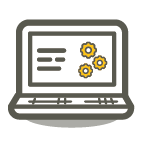The past year has been tough for everyone, with many business processes being forced to change during the pandemic. With the nationwide shift online, cloud-based software for communication and document sharing has become essential to ensure businesses retain efficient ways of working. For most audit teams, this has meant a turnaround of operations.
Even though processes involving collecting and accessing information are quickly developing, the fundamental principles of auditing are unchanged. However, this has resulted in an increased audit risk surrounding fraud, and some additional logistical challenges. Despite this, audit teams have adapted to the new working environment and have seen benefits from it. For example, some areas have improved their efficiency and are more assured over compliance with GDPR due to the use of the latest technology and document sharing platforms. However, not all areas have experienced the same, and mixed feedback has been received. Thus, is the current environment good for the audit profession?
How has remote working changed the way we audit?
Even with the surrounding uncertainty over the effectiveness of a remote audit, the industry has responded fast to the pandemic. Remote walkthroughs and interviews have proved more efficient than expected. However, remoteness has brought about numerous challenges which have disadvantaged both the client and audit team. Adding value through face-to-face conversations has been lost, resulting in a reduced opportunity for the auditors to obtain nuances of information that would benefit the audit. Transparency has also been reduced through the lack of on-site fieldwork.
The pandemic has increased the importance of technology within the audit profession. The need for scanning and signing physical documents has diminished, due to the increased use of e-signing and e-filing software, greatly improving the efficiency of operations. However, remote working has seen a rise in the number of cyber-attacks, due to teams spread around the world operating under unknown network connections. Hence, more than ever, IT risk assessments are necessary in order to protect business information.
Even though the latest technology has improved audits, there is still concern that the audit process is less efficient than before. In the remote working environment, auditors rely on business owners to send them the required documentation, whereas before the pandemic, these documents could be found in onsite filing cabinets. This greatly increases the length of the audit, especially for clients who are still operating paper systems, as if any errors arise, time is necessary to be invested in order to resolve these issues.
Government extensions have been ceased
Initially, the Government issued a three-month extension period for businesses to file their end of year accounts. This was to reduce the time pressure companies and auditors were facing, and to ensure the International Standards on Auditing (ISA) were followed with due care. Now however, businesses and their auditors must provide reports on time, as this extension was ceased for year ends after 30th June 2020.
Training junior members of staff remotely creates challenges
Audit fieldwork tends to be ideal for trainees to learn from their peers and other team members, and to gain valuable experience via on-the-job coaching. Remote working has raised difficulties in providing trainees with this. A knock-on effect could incur causing a greater problem for the future. Therefore, firm planning is essential in order to combat these difficulties, and to ensure that sufficient resources are readily available to develop and catch up these trainees in the future.
The resilience of the industry has been clearly shown throughout the pandemic and has demonstrated that remote auditing is possible. Technological advancements have accelerated and become a necessity, despite many firms having already started implementing the new technology and upgrading their systems.
What does the hybrid way of working look like for auditors?
A hybrid way of working for the audit profession is very likely to be the case in the future. For this to be successful, it is vital teams are introduced and have training on the latest systems and software, since flexible working is reliant on communications technology. Competent teams in using such tools, as well as other systems such as cloud-based client portals, will help with the smooth adaptation to this new way of working.
Analytical skills are also becoming increasingly essential in the audit due to the advances in accounting and audit software, which makes use of data analytics. This is positive for the industry, since it will help result in a greater understanding of how businesses operate and their financial performance.
The largest change in the profession, is the increase in flexible working. This has had a positive impact on the auditor’s work-life balance, by allowing them to control when and how they work. In some ways, flexible working has also aided the recruitment process, in the larger geographical talent pool available to recruit from. Encouraging new entrants at a time when the profession most needs them can only be a positive for the industry.
With the Government’s roadmap to recovery in place, sometime in the future, audit teams will be able to resume in person meetings and on-site visits. While these have been missed, a new hybrid way of working will mean audit teams can also work from home where possible.
Summary
Overall, the pandemic has demonstrated the resilience and agility of the audit profession. The implementation of rapid technological advancements has provided several benefits in terms of flexible working. Whilst the fundamental principles of audit will remain unchanged, making the most of these benefits will be essential in safeguarding the future of auditing and in welcoming new talent.



